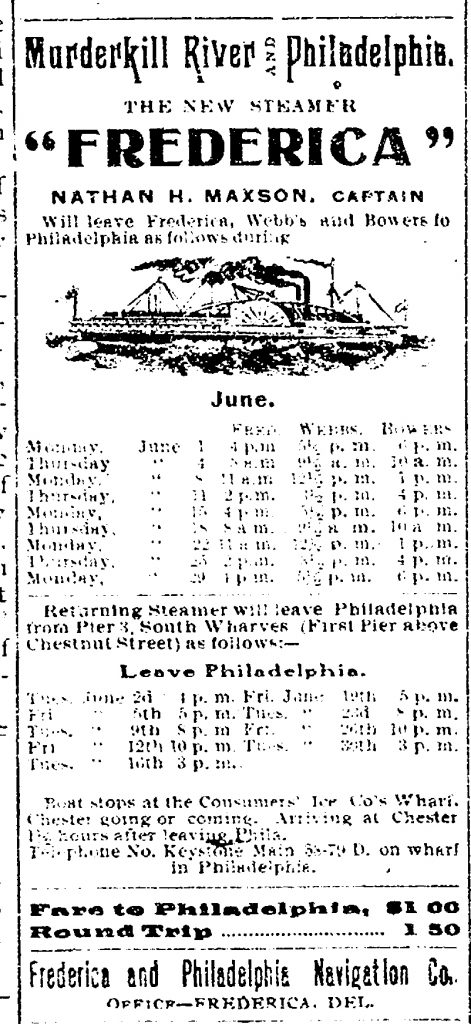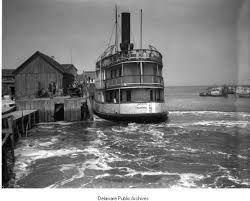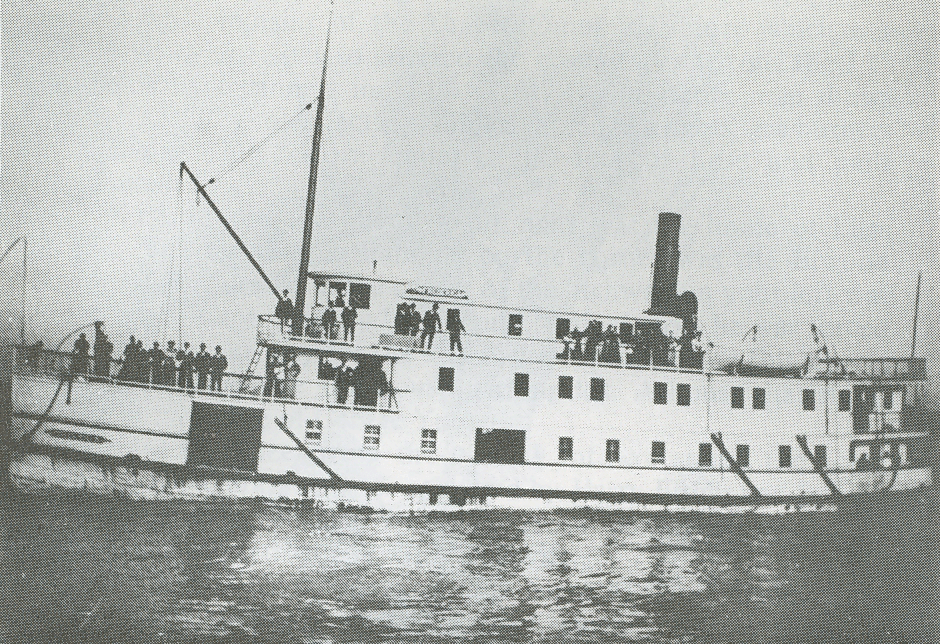We made a brief visit to Frederica last week. A visit of a few days only. On the first morning after our arrival we were awakened by the sonorous voice of the steamer Frederica coming up the river, and later saw the passengers coming up a street of the town and distributing themselves to their varied places of abode. About five o’clock of a morning the toot, toot of a fish horn may be heard, and the people get their fish for breakfast, fresh from the beach; or the water at the beach. In Milton there would be but few persons out of bed, at that time of the morning to buy. Now I am not like the Englishman who thought England the best country on earth and himself the best man in the realm, but I do think Milton the best place on the Delaware, Maryland and Virginia Peninsula, and will ignore the last clause of the preceding sentence. And yet I am not so blind that I cannot see Milton’s faults, nor so infatuated that I cannot relate them. From time to which our “memory runneth not back,” it has been said: “Our best friends are they who tell us our faults and teach us to correct them.” This we have been trying to do with Milton, but like Ephraim she is “joined to her idols,” or else think her would-be instructor is an incompetent teacher. Milton’s principal fault is late rising. The others are inconspicuous, and not pertinent to the present writing. The two towns, Frederica and Milton, present some points of resemblance and some of contrast. Geographically considered, they are nearly alike. Frederica has a passenger service to Philadelphia by steamer—which is pleasant, at this season—and a six miles drive by stage, to connect with railroad transportation. Milton has no passenger line to anywhere by steamer but ample railroad facilities right from the town, Frederica beats Milton, numerically, in its orchestra of dogs, but we don’t recognize the notes to be more dulcet than are the canines’ on the banks of the Broadkiln. The closing of the stores in Frederica at 6 o’clock p. m. gives the clerks a chance to play ball on the streets, in the lower part of the town, or anywhere else they may want to; the clerks in Milton play anytime of the day the “spirit moves them” out on the street in the hot sun, and are often joined by their proprietor, and our other young men, who wouldn’t work a day; no! not an hour, if one called the vocation “work.” Time, time, relentless time! That is ever on the move, brought our limited stay in Frederica to a close on Saturday, and as we journeyed homeward memory brought back to our mind one of those beautiful, poetic, and truthful stanzas we had learned in boyhood:
“Time like an ever rolling tide
Bears all its sons away.
They fly forgotten as a dream,
Die as the opening day.”[i]



Yes, time brings its changes of fashion, and contour of body. The follies of youth give place to the foibles of age; and so we pass on, and out. When we arrived at Ellendale we found train cancelled to connect, The D. M. & V. had changed its schedule on that day. This is nothing new for the company to do. We accepted the situation, laid over at Ellendale until the evening train, had an interesting tête-a-tête with “Paul Pry,” saw the sights in this pretty growing town, and arrive in Milton too late for the school election, However, the school election came off, and as is always the case, unless the election is not contested, one part was victorious and the other defeated. The campaign of this school election has been on for some weeks, and on Saturday approached its apogee, or its climax, if you like a word that doesn’t sound so much as if it had been made on a curling iron. The three commissioners—Thomas H. Douglass, Charles H. Davidson, and Daniel Wagamon—whose term of office had expired, were re-elected. Four suffragettes voted; but their doing so did not decrease the amount of their taxes one cent; neither will it stop the public schools. The Board met on Monday morning and elected J. H. Davidson., president, J. C. Lank, secretary, and T. H. Douglass treasurer.
Work on the public wharf is completed.
Prof. W. G. Fearing has been awarded the contract to paint the M. P. Parsonage.
J. Polk Davidson, who has been suffering with a lame back, has about recovered.
The ladies of Reynolds Church and the ladies of Weigand Chapel will hold festivals. The former in the grove near the church on Thursday July 1st; the latter in the grove near their church on Friday and Saturday evening July 9th and 10th. The Milton Firemen Band expects to be present on both occasions.
It is proposed to celebrate the Fourth of July with many attractive features—to some—chief of which will be the evening services at Jester’s Park—speaking, fireworks, and other symbols characteristic of patriotism. But no “greased pigs,” “tub races,” or other relics of barbarism will be allowed.
Miss Maggie Decker of New York is the guest of her father.
Barge No. 6 that was built by J. P. Davidson and has been laying at Milton dock since the early spring, was towed to her future home, Pennsgrove, N. J., last week.
According to the schedule of the D. M. & V. R. R. Co. that went into effect last Sunday, no connection is made at noon at Ellendale with trains from the north, for Milton. Passengers coming to Milton will come on the evening train, as these connect, at present; but we do not know how long they will continue to do so.
Lavinia Bridge was repaired last week and that road to Milton is passable again.
The Misses Sallie and Susie Carey, of Glensdale, Pa., are occupying their Milton residence for a few days.
The residence of Mrs. Mary Jones, situated near Union Street and Bay Avenue, was struck by lightning on Monday afternoon, and considerably damaged from garret to cellar.
At 6:30 on Tuesday morning a very pretty wedding was solemnized at the residence of Mr. and Mrs. J. B. Welch, on North Union Street, when their daughter Miss May Welch became the bride of Mr. Allison Blizzard of Wilmington, Del. The bride was attended by her sister, Miss Lottie Welch, and Mr. William Wagamon was the groom’s best man. The ceremony was performed by the Rev. A. C. McGilton D. D., minister of Goshen M. E. Church. After the wedding breakfast Mr. and Mrs. Blizzard with their attendants boarded the D. M. and V.’s 7.34 westbound train. The bride and groom will visit Buffalo, Niagara Falls, and other points. On their return they will reside in Wilmington. Beside the relatives and friends of the family in Milton there were in attendance from Wilmington Mr. and Mrs. Blizzard. Parents of the groom, and Mr. and Mrs. David Mason.
Miss Emma King returned on Monday from a visit to Swedesboro, N. J.
Martin V. Fleetwood died at his home near Stockley on Thursday of tuberculosis, aged 28 years, 11 months and 17 days. Funeral at Bethesda on Sunday afternoon by the Rev. Thomas and burial in St. John’s cemetery by S. J. Wilson.
Hannah Joseph, wife of Lemuel Joseph, died at Hollyville on Saturday of heart trouble, aged 46 years, 3 months and 9 days. Funeral at […] on Monday afternoon and interment at St. George’s Cemetery by S. J. Wilson & Son.
Mrs. Joshua Carey was stricken with paralysis on Monday night, and is now in a critical condition.
The much needed repairs to the porch in front of the “big store” are being made.
The announcement is made of the marriage of the Rev. Martin Damer of Milton, formerly record of the P. E. Church of this town, to take place in New York on Tuesday July 6th and to a lady of that city or state.[ii]
James T. Spicer of Ellendale died at the Delaware Hospital on Tuesday aged 48 years, 7 months and 22 days. The remains were brought to Milton on Wednesday evening train. Funeral service and interment took place at Sand Hill on Thursday afternoon. Rev. Hopkins of Ellendale conducting the former; S. J. Wilson & Son the latter.
————————————————————
[i] The verse is taken from the hymn Our God, Our Help in Ages Past, by Isaac Watts, and paraphrases Psalm 90.
[ii] The bride was Lilla F. Lees of New York.
